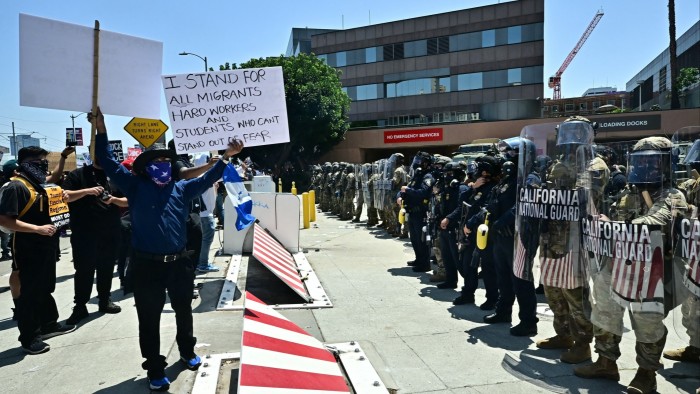This article is an on-site version of our FirstFT newsletter. Subscribers can sign up to our Asia, Europe/Africa or Americas edition to get the newsletter delivered every weekday morning. Explore all of our newsletters here
Good morning and welcome to FirstFT Asia. In today’s newsletter:
-
National Guard deployed to Los Angeles
-
US deems China’s planned London embassy a security risk
-
Duolingo’s CEO discusses AI plans
We start in the US, where National Guard troops were deployed on the streets of Los Angeles yesterday as the Trump administration took a hard line to quell protests against raids on suspected illegal immigrants.
What happened: President Donald Trump ordered the deployment of troops on Saturday using a rarely invoked law designed to repress invasions and rebellions. California governor Gavin Newsom decried the move as “inflammatory”. It comes after two days of unrest in the second-largest US city that were prompted by federal agents arresting dozens of people in a sweep of local businesses. On Sunday evening (local time), Trump did not rule out sending in marines after the move was first threatened by defence secretary Pete Hegseth.
Trump vs California: The deployment of up to 2,000 guardsmen will test the ability of heavily Democratic states to resist the Trump administration’s agenda and protect their citizens from its enforcement actions. The president’s decision to “federalise” the National Guard — or transfer it from state to federal control — was highly unusual. The last time a president sent in the Guard without a request by the state governor was in 1965, when Lyndon Johnson sent troops to protect civil rights marchers.
Read more about the stand-off between the White House and California.
Here’s what else I’m keeping tabs on today:
-
Economic data: China reports May inflation figures and trade data. Japan publishes a revised first-quarter GDP estimate.
-
US-China relations: High-level US and Chinese officials are set to meet in London for a new round of trade talks.
Five more top stories
1. The White House has expressed concern to the UK government over allowing China to build a large embassy in London that security officials believe would pose a risk to sensitive communications infrastructure serving the City. The 20,000 sq m compound would be more than 20 times the size of Beijing’s current embassy in Marylebone and would be Beijing’s biggest embassy in Europe.
2. Coal India, the world’s largest coal-producing company, is reopening more than 30 mines and launching up to five more on greenfield sites this year, saying the country’s renewables sector is yet unable to meet its growing energy demand. PM Prasad, chair of the state-owned company, said that India would reach peak coal by 2035. Read the full interview.
3. China’s success in snarling global supply chains by stemming the flow of rare earths has shifted the balance of power in trade talks with the US, analysts and businesspeople say. The danger for Washington and the EU — both are locked in trade wars with China — is that Beijing’s newfound leverage can also be replicated in other areas of the high-tech supply chain.
4. Dozens of global business executives will travel to Washington this week to push back against a plan to raise taxes on foreign investments in the US, warning it may hit millions of American jobs. The lobbying drive is targeting a provision in Trump’s budget bill, which if approved by Congress would allow the US to impose additional taxes on companies and investors from countries that it deems to have punitive tax policies.
5. Apple is struggling to deliver upgrades to its artificial intelligence voice assistant for the iPhone, with investors downbeat about the potential for major AI announcements at its flagship annual event this week. Recently departed employees told the FT that technological challenges have led to delays to the full rollout of the company’s “Apple Intelligence” features.
Interview: Duolingo CEO Luis von Ahn

Last month, Duolingo chief executive Luis von Ahn shared an email on LinkedIn that he had sent to all staff announcing the language-learning app was going “AI-first”. The move generated controversy: “Cancelling my account NOW,” wrote one LinkedIn commenter. “Well, there goes my 1,098 day streak,” posted another. In an interview with the FT’s Emma Jacobs, von Ahn admitted he “did not expect the amount of blowback.” Read what he said about Duolingo’s AI-first strategy.
We’re also reading . . .
-
Musk vs Trump: The meeting of company builder and monarch was never going to end well, writes Silicon Valley investor Michael Moritz.
-
Golden Dome: Trump’s $175bn missile shield project has triggered a lobbying battle between Silicon Valley and America’s biggest defence groups.
-
Lay-offs: Dismissing people by email or phone is still distressingly common and needs to stop, writes Pilita Clark.
Chart of the day
The rapid deployment of self-driving features on Chinese cars has sparked alarm among regulators in Beijing, who have made the industry tap on the brakes while they assess questions over safety and liability.
Take a break from the news
Cape Town is at a crossroads: those flocking to live in South Africa’s second city are powering the economy, but also driving up house prices and exacerbating a strained market and local infrastructure. For a city surrounded by ocean and mountains, the expansionist path forwards is a complex one, writes Mary Holland.




